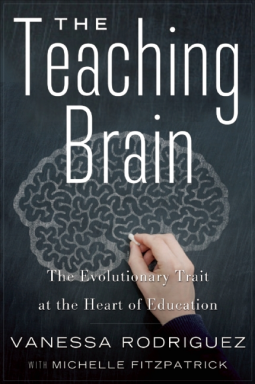
The Teaching Brain
An Evolutionary Trait at the Heart of Education
by Vanessa Rodriguez, Michelle Fitzpatrick
This title was previously available on NetGalley and is now archived.
Send NetGalley books directly to your Kindle or Kindle app
1
To read on a Kindle or Kindle app, please add kindle@netgalley.com as an approved email address to receive files in your Amazon account. Click here for step-by-step instructions.
2
Also find your Kindle email address within your Amazon account, and enter it here.
Pub Date Nov 18 2014 | Archive Date Feb 23 2015
Smith Publicity | New Press, The
Description
While research about the nature and science of learning abounds, shockingly few insights into how and why humans teach have emerged—until now. Countering the dated yet widely held presumption that teaching is simply the transfer of knowledge from one person to another, The Teaching Brain weaves together scientific research and real-life examples to show that teaching is a dynamic interaction and an evolutionary cognitive skill that develops from birth to adulthood. With engaging, accessible prose, Harvard researcher Vanessa Rodriguez reveals what it actually takes to become an expert teacher. At a time when all sides of the teaching debate tirelessly seek to define good teaching—or even how to build a better teacher—The Teaching Brain upends the misguided premises for how we measure the success of teachers.
This game-changing analysis of how the mind teaches will transform common perceptions of one of the most essential human practices (and one of the most hotly debated professions), charting a path forward for teachers, parents, and anyone seeking to better understand learning—and unlocking the teaching brain in all of us.
A Note From the Publisher
Author is available for interviews, blog tours, autographed book giveaways, contests, and book club discussions.
Marketing Plan
Available Editions
| EDITION | Paperback |
| ISBN | 9781595589965 |
| PRICE | $26.95 (USD) |
Average rating from 11 members
Featured Reviews
 David W, Media/Journalist
David W, Media/Journalist
It's a wonder I can think at all
With all the (deserved) fuss over teaching, education, life-prep and what goes on in a student’s brain, we have largely neglected the other side of the equation. What goes on in a teacher’s brain is an integral part of the process. It takes both a teacher and a learner, and Vanessa Rodriguez has focused on this under-studied aspect.
There is a lot of groundwork to cover before she gets to her point. Rodriguez justifiably dismisses the empty-vessel model in which teachers are there to pump data into empty heads. “The basic input-output model of teaching-learning brings us up to the development level of a dog, chimp or bird.” Various other theories don’t cover the entire process either. She posits that teaching is innate. We see it in children who have no training. But she also says it takes a lifetime to master. And of course, we don’t collect and spread the best; we simply let them go and replace them with others who need a lifetime to master the skillset. So is it any wonder that progress remains largely a concept?
Rodriguez doesn’t penetrate the actual neurology of the teaching brain much. She says it is too early in our learning curve for that. But in her view, the teaching brain is buffeted by dozens of factors from the upbringing of the teachers, to the prejudices they bring to the classroom, to the cues they give and receive in interactions. Once aware that these are even factors, it can help improve both the teachers’, and the students’ performances.
The kind of teachers Rodriquez refers to (and that she is) are entirely alien to me. These are thoughtful, caring, perceptive and nurturing people. They are endlessly creative in their approach. It is worth following Rodriguez’s line if only because she looks at her calling so much more profoundly (than any teacher I ever had). She is one to watch.
David Wineberg




